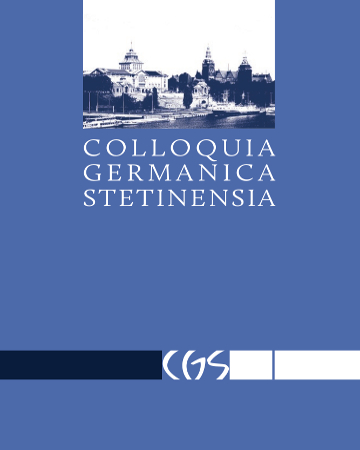







| Authors: |
Aleksandra
Burdziej

Uniwersytet Mikołaja Kopernika w Toruniu, Katedra Literatury i Kultury Krajów Niemieckojęzycznych XIX-XXI Wieku |
| Keywords: | Heimat Juli Zeh social criticism system of values |
| Data publikacji całości: | 2023-11 |
| Page range: | 22 (69-90) |
| Downloads ?: | 315 |
| 1. | Aydemir, Fatma, Hengameh Yaghoobifarah (Hg.). Eure Heimat ist unser Alptraum. Berlin: Ullstein fünf, 2019. |
| 2. | Bescansa, Carme, Ilse Nagelschmidt (Hg.). Heimat als Chance und Herausforderung. Repräsentationen der verlorenen Heimat. Berlin: Frank & Timme, 2014. |
| 3. | Böhnisch, Dana, Jil Runia, Hanna Zehschnetzler. „Einleitung: Revisiting ‚Heimat‘“. In: Heimat Revisited. Kulturwissenschaftliche Perspektiven auf einen umstrittenen Begriff, hrsg. v. Dana Böhnisch, Jil Runia, Hanna Zehschnetzler, 1–19. Berlin: De Gruyter, 2019. |
| 4. | Brockhaus-Enzyklopädie. Zugriff 28.04.2023. https://brockhaus.de/ecs/enzy/article/heimat. |
| 5. | Egger, Simone. Heimat: Wie wir unseren Sehnsuchtsort immer wieder neu erfinden. München: Riemann, 2014. |
| 6. | Encke, Julia. „Bloß nicht bewegen“. Frankfurter Allgemeine Zeitung, 02.06.2020, Zugriff 28.04.2023. https://www.faz.net/aktuell/feuilleton/buecher/rezensionen/belletristik/neues-buch-von-juli-zeh-ein-buch-ueber-die-corona-pandemie-16793883.html. |
| 7. | Faeser, Nancy. Twitter-Seite. Zugriff 28.04.2023. https://twitter.com/nancyfaeser/status/1526637717752274946. |
| 8. | Gebhard, Gunther, Oliver Geisler, Steffen Schröter (Hg.). Heimat. Konturen und Konjunkturen eines umstrittenen Konzepts. Bielefeld: transcript, 2015. |
| 9. | Geisenhanslüke, Achim. „‚Die verlorene Ehre‘ der Mia Holl. Juli Zehs ‚Corpus Delicti‘“. In: Technik in Dystopien, hrsg. v. Viviana Chilese, Heinz-Peter Preusser, 223–232. Heidelberg: Universitätsverlag Winter, 2013. |
| 10. | Gensing, Patrick. „Das Fremde als Bedrohung“. TAZ, 07.11.2015, Zugriff 28.04.2023. https://taz.de/Die-Deutschen-und-der-Heimat-Begriff/!5246134/. |
| 11. | Huxley, Aldous. Schöne neue Welt. Ein Roman der Zukunft. Übers. v. Herberth E. Herlitschka. Frankfurt a. M.: Fischer Taschenbuch, 2007. |
| 12. | Lenz, Siegfried. Heimatmuseum. Hamburg: Hoffmann und Campe, 1978. |
| 13. | Leuschner, Udo. Arkadien. Entstehung einer Traumlandschaft. Serie „Sehn-Sucht“, HTML-Fassung fürs Internet 2000, PDF-Datei 2003. Zugriff 28.04.2023. http://www.udo-leuschner.de/pdf/arkadien.pdf. |
| 14. | Monecke, Nina. „Warum der Begriff Heimat nicht zu retten ist“. Zeit Online, 10.03.2019, Zugriff 28.04.2023. https://www.zeit.de/zett/politik/2019-03/warum-der-begriff-heimat-nicht-zu-retten-ist?utm_referrer=https%3A%2F%2Fwww.google.pl%2F. |
| 15. | Olejniczak, Józef. Arkadia i małe ojczyzny. Kraków: Oficyna Literacka, 1992. |
| 16. | Orwell, George. 1984. Übers. v. Karsten Singelmann. Hamburg: Rowohlt Taschenbuch, 2021. |
| 17. | Pariser, Eli. Filter Bubble. Wie wir im Internet entmündigt werden. Übers. v. Ursula Held. München: Carl Hanser, 2012. |
| 18. | Scharnowski, Susanne, Liane von Billerbeck. „In Zeiten des Umbruchs wird das Vertraute wichtig“, 27.06.2019. Zugriff 28.04.2023. https://www.deutschlandfunkkultur.de/der-begriff-heimat-in-zeiten-des-umbruchs-wird-das-100.html. |
| 19. | Schlink, Bernhard. Heimat als Utopie. Frankfurt a. M.: Suhrkamp, 2000. |
| 20. | Schmitt-Roschmann, Verena. Heimat: Neuentdeckung eines verpönten Gefühls. Gütersloh: Gütersloher Verlagshaus, 2010. |
| 21. | Schönfellner, Sabine. „Erzählerische Distanzierung und scheinbare Zukünftigkeit. Die Auseinandersetzung mit biomedizinischer Normierung in Juli Zehs Romanen ‚Corpus Delicti‘ und ‚Leere Herzen‘“. Zeitschrift für Germanistik 3 (2018): 540–554. |
| 22. | „So trägt Verbundenheit zur Spaltung bei“. 18.11.2020. Zugriff 28.04.2023. https://science.orf.at/stories/3203009/. |
| 23. | Türcke, Christoph. Heimat: Eine Rehabilitierung. Springe: zu Klampen Verlag, 2006. |
| 24. | Wehle, Winfried. „Arkadien – eine Kunstwelt“. In: Pluralität der Welten – Aspekte der Renaissance (Romanistisches Kolloquium IV), hrsg. v. Wolf-Dieter Stempel, Karlheinz Stierle, 137–166. München: Brill / Fink, 1987. |
| 25. | Wehle, Winfried. „Wunschland Arkadien“. Compar(a)ison 2 (1993): 19–35. |
| 26. | Weidermann, Volker. „Ihr Alptraum von der Gesundheitsdiktatur“. Spiegel Online, 22.03.2020. Zugriff 28.04.2023. https://www.spiegel.de/kultur/literatur/juli-zeh-ihr-albtraum-von-der-gesundheitsdiktatur-a-00000000-0002-0001-0000-000171037363. |
| 27. | Welsh, Caroline. „Brauchen wir ein Recht auf Krankheit? Historische und theoretische Überlegungen im Anschluss an Juli Zehs Roman ‚Corpus Delicti‘“. In: Das Menschenrecht auf Gesundheit: Normative Grundlagen und aktuelle Diskurse, hrsg. v. Andreas Frewer, Heiner Bielefeldt, 215–238. Bielefeld: transcript, 2016. |
| 28. | Wierzbicka, Anna. „Słownik kluczem do historii i kultury. ‘Ojczyzna’ w językach niemieckim, polskim i rosyjskim“. In: Anna Wierzbicka. Język – umysł – kultura, hrsg. v. Jerzy Bartmiński, 450–489. Warszawa: Wydawnictwo Naukowe PWN, 1999. |
| 29. | Zeh, Juli. Corpus Delicti. Ein Prozess. Frankfurt a. M.: Btb, 2009. |
| 30. | Zimmer, Marc. „‚Begriff Heimat positiv umdeuten‘ – Faeser-Tweet erntet Kritik“, 20.05.2022. Zugriff 28.04.2023. https://www.mdr.de/nachrichten/deutschland/panorama/nancy-faeser-heimat-umdeuten-100.html. |